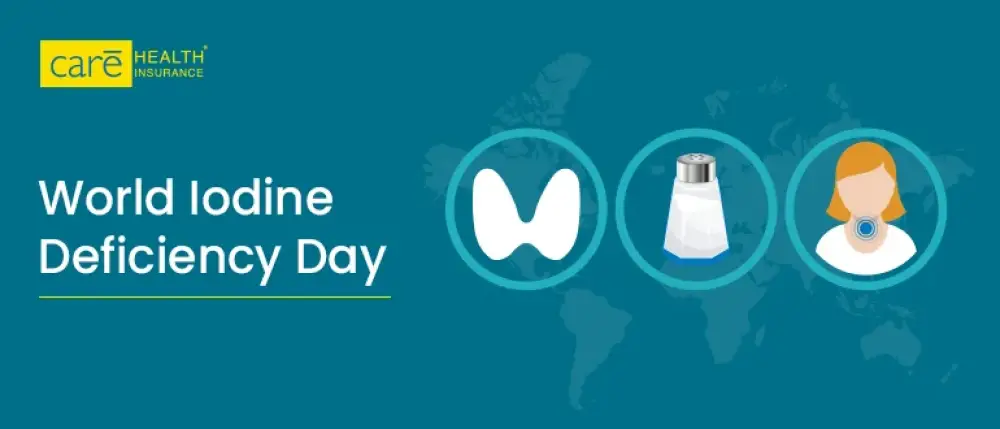Subscribe to get weekly insights
Always stay up to date with our newest articles sent direct to your inbox
Published on 27 Oct, 2025
56 Views
4 min Read

Written by Mudit Handa
Reviewed by Akhil Pillai
favorite0Like
favoriteBe the First to Like
Iodine is an essential dietary component that is crucial for physical and neurological development of our bodies. However, a vast majority of Indians suffer from iodine deficiency. Approximately 70 million people in India currently suffer from iodine deficiency disorders (IDD), with an additional 350 million at risk due to insufficient iodine intake from salt. These figures were recently highlighted in a report by Dr. Purnima Agarwal MD/DM, Associate Professor, Department of Endocrinology, VMMC and Safdarjung Hospital*.
World Iodine Deficiency Day, observed on October 21st, highlights the critical importance of iodine for human health, particularly for proper growth and development. Iodine is an essential micronutrient that the body needs but cannot produce on its own.
Iodine is crucial for the synthesis of thyroid hormones, which play a vital role in brain development, especially during fetal life and early childhood. Deficiency can lead to impaired cognitive function, reduced IQ, and developmental delays.
Iodine intake is essential for the synthesis of thyroxine hormone, which facilitates the development of the human body.
The body's requirement for iodine can only be fulfilled by consuming iodine-rich foods and iodised salt.
World Iodine Deficiency Day aims to educate the public, healthcare professionals, and policymakers about the importance of iodine for overall health, especially for pregnant women and children. It emphasises the devastating effects of iodine deficiency, which can include goitre, hypothyroidism, and impaired cognitive development, particularly in foetuses and young children.
Accordingly, it serves the following objectives:
The official theme for World Iodine Deficiency Awareness Day 2025 has not been announced yet.
However, the World Iodine Deficiency Day theme generally revolves around the significance of iodised salt in removing iodine deficiency. For instance, the official theme for World Iodine Deficiency Day 2024 was "Salt it up for good health!". This theme highlighted the crucial role of adequate iodine intake, especially through iodised salt, for healthy growth and development.
Iodine deficiency, defined as an intake below 10 to 20 mcg/day, can lead to the following health issues:
Iodised salt is the most common and effective way to ensure adequate iodine intake, as it's fortified with iodine. Apart from that, the following foods are rich in iodine and can help prevent deficiency:
Besides taking an iodine-rich diet, it is important to have a safety net to fight medical emergencies that may arise due to a deficiency disease, in the form of health coverage.
Getting treatment for thyroid-related illness? No more worries about the treatment costs and regular medications if you have adequate health coverage. Ideally, opt for a comprehensive critical illness insurance plan that includes fundamental benefits like annual check-up coverage. Additionally, prioritise plans offering reduced waiting periods for pre-existing conditions such as thyroid disorders.
Disclaimer: All plan features, benefits, coverage and claims underwriting are subject to policy terms and conditions. Kindly refer to the brochure, sales prospectus and policy documents carefully.
favoriteBe the First to Like
Thyroid : मामूली नहीं हैं महिलाओं में थायराइड होना, जानें इसके लक्षण और घरेलू उपचार Vipul Tiwary in Diseases
शुगर कंट्रोल कैसे करे? जानें, डायबिटीज में क्या खाना चाहिए Vipul Tiwary in Health & Wellness
हाई ब्लड प्रेशर को तुरंत कंट्रोल कैसे करें? देखें इसके उपाय Vipul Tiwary in Diseases
पैरों में दर्द किस कमी से होता है? जानें, इसके घरेलू इलाज Vipul Tiwary in Health Insurance Articles
Neglecting Oral Health and Hygiene? Your Brain Could Suffer the Consequences Jagriti Chakraborty in Mental Health
Unlock Your Health: Protein Powder for Women and Key Supplements Jagriti Chakraborty in Diet & Nutrition
Forget Yoghurt: 8 Probiotic Foods That Actually Work Jagriti Chakraborty in Health & Wellness
BIG Update: Nipah Virus Is Back, Here’s How to Stay Safe! Sejal Singhania in Health Insurance Articles
Always stay up to date with our newest articles sent direct to your inbox
Loading...